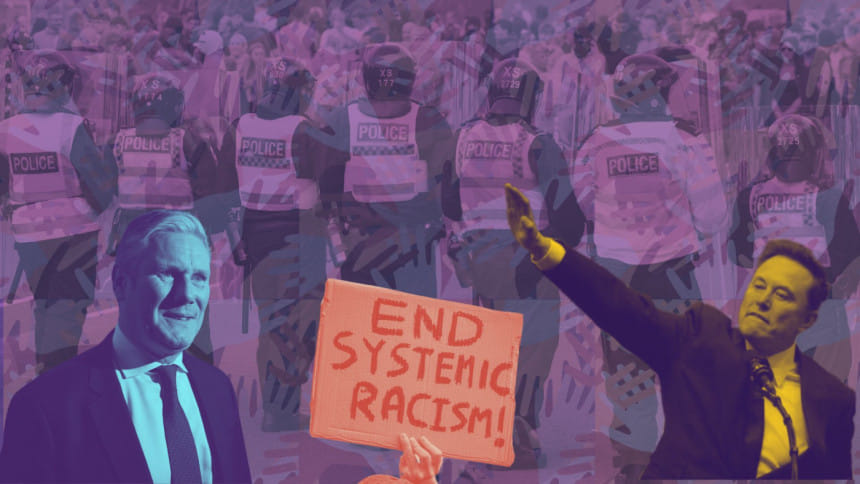Lusting Orientals revisited: The British grooming gang debate

The acclaimed British writer EM Forster wrote his masterpiece A Passage to India (1924) at a time of sharp racial and social divisions between the coloniser and the colonised in India. The novel is set in the early 20th century when anticolonial struggles began to flare up, as Gandhi's call for nonviolent revolution attracted a large following.
In the novel, a white British young woman named Adela Quested—chaperoned by Mrs Moore—came to India and "was desirous of seeing the real India." Dr Aziz took her and Mrs Moore to the Marabar Caves.
After visiting only one cave, Mrs Moore became exhausted and discontinued the adventure, as the echo inside its narrow confines made her claustrophobic. Aziz took Adela to the upper caves. She was struck by his physical beauty and mused: "What a handsome little Oriental he was." She "regretted that neither she nor" her fiancé and Mrs Moore's son Ronny Heaslop "had physical charm."
The climax of the novel revolves around an incident that took place in one of the upper caves where Adela entered by herself while Aziz was in another. She had a muddled experience there and later (in court) accused Aziz of attempted rape. Forster doesn't explain in the novel what actually happened to Adela in the cave. However, in 1924 he said to his friend, the Cambridge historian and writer Goldsworthy Lowes Dickinson: "In the cave, it is either a man, or the supernatural, or an illusion. And even if I know! My writing mind therefore is a blur here—i.e. I will it to remain a blur, and to be uncertain."
In the court, the British police officer (prosecutor) Mr McBryde "was not at pains to be an interesting speaker" and did not deem it necessary to make any "moral or emotional appeal." He took it for granted that Aziz was guilty and would duly be sentenced and banished to the Andamans. However, McBryde couldn't resist the temptation to share some ideas of "Oriental Pathology"—his favourite topic. He took off "his spectacles, as was his habit before enunciating a general truth" and "remarked that the darker races are physically attracted by the fairer, but not vice versa." Long story short, Adela came to her senses and dropped the charge against Aziz who was then acquitted.
When writing A Passage to India, Forster might have had in mind post-Great Rebellion British literature that depicted white European women in India as victims of sexual violence by the rebels of the uprising that happened in 1857-58. In his book Rule of Darkness: British Literature and Imperialism, 1830-1914 (1988), Indiana University professor of English Patrick Brantlinger states that at least fifty British novels about the Great Rebellion "were written before 1900, and at least thirty more before World War II." Brantlinger mentions some "sensational eyewitness accounts, such as Mrs. J. A. Harris's Lady's Diary of the Siege of Lucknow (1858)" that "expressed a general racist and political hysteria about the" rebellion.
In an essay titled "Mutiny Narratives and the Imperial Feminine" (1998), the British scholar Penelope Tuson states:
"In the period immediately after the Rebellion a grossly exaggerated picture emerged of widespread physical attacks on European women and of the degradation and violation of female virtue and honour…. Although more lurid accounts of rape and torture were subsequently discredited by official inquiries, the much-publicised images of terrified and dying white women and children remained fixed in the public mythology of 1857."
In most of these British literary representations of the Rebellion, Indian men (rebels) are portrayed as lusting after white women who are seen as embodiments of purity and virtue. British writers vividly described lewd and lascivious acts committed against white women and invoked the trope of lustful Indianness to rationalise the disproportionate colonial response to the anticolonial struggle.
The British colonial government crushed the Great Rebellion, slaughtered the rebels and other Indians en masse, waded in their blood, plundered and destroyed their properties and dishonoured women before killing them—most of whom were Muslim. By fetishising memsahibs—wives of British colonisers or women missionaries in India—as objects of Indian men's sexual desire, Victorian English writers made a desperate bid to justify the genocidal British reaction to the Rebellion and to "legitimize more authoritarian, forceful, and racist policies" in India. By writing A Passage to India, EM Forster sought to counter a long tradition of representing the colonised as sexual predators and white English women as their victims.
The resurfacing of the debate about British grooming gangs in the past weeks should be understood through the prism of this pervasive colonialist and Orientalist discourse of perceiving Asians (and Africans) as lusting Orientals.
The grooming gang scandal in Britain is more than ten years old. It first received significant public attention when The Times published a story titled "Revealed: conspiracy of silence on UK sex gangs" on 5 January 2011. It discussed rape crimes in some parts of North England with sizeable populations of Asian (Pakistani) origin. Dubbed as "on-street grooming," the rape crime was given a racial colouring; the perpetrators were identified as British Muslim men of Pakistani background.
The racial profiling of the problem had a heightened media frenzy when—days after the Times report—the politician Jack Straw stepped into the fray by making stereotypical comments about British Pakistanis. He said: "But there is a specific problem which involves Pakistani heritage men ... who target vulnerable young white girls … who they think are easy meat."
Years later, on 10 August 2017, another British newspaper, The Sun, ran a sensational story titled "British Pakistani men ARE raping and exploiting white girls… and it's time we faced up to it." All such frenetic media barrages demonised (Muslim) Pakistani men in a one-dimensional, simplistic, and racist way and totally buried the fact that the victims included non-white (Pakistani) girls too. Moreover, the media showed little interest in the gender and class factors, as the perpetrators are men and the victims, from the working class.
Recently, the world's richest man Elon Musk intruded into the British grooming gang debate through tweets and retweets on social media. In an apparent move to destabilise or weaken Britain's Labour Party government, he rehashed this old scandal of child sexual exploitation and accused Prime Minister Keir Starmer of complicity in sex crimes and of not doing enough to stand by the victims. Musk said: "[Starmer] repeatedly ignored the pleas of vast numbers of little girls and their parents, in order to secure political support." Musk accused Starmer of political opportunism for incidents that occurred in 2011 and before, even though the latter entered politics in late 2014 and became an elected representative in 2015.
We can dismiss Musk's statements as lies and deliberate distortions of facts, but it's difficult to ignore the detrimental impact of the influencer's social media posts on his hundreds of millions of followers.
Interestingly, according to a February 2024 report of the CSA Centre in Britain, in 2021 white people comprised 83 percent of the population in England and Wales, but in 2022 they were 88 percent of the defendants (accused) in the court for "child sexual abuse offence." Conversely, as regards British Pakistanis and Bangladeshis, both the populations and defendants were two percent and one percent, respectively.
The above data do not suggest that, in child sexual exploitation or on-street grooming, British Pakistanis or Bangladeshis (most of whom are predominantly Muslim) outperform their white counterparts. Despite that, in the grooming gang debate, Asians (mainly Pakistanis) and their religion have been under the media spotlight.
While imams and Muslim community leaders are expected to condemn grooming gangs, their counterparts in the white population are not. What is worse, the religion (Islam) of British Pakistanis is indirectly blamed for on-street grooming—that involves alcohol—even though alcohol abuse and rape are major sins in the religion.
Sexual predators of Muslim origin are identified by their religion, but those of other faith communities are not. For example, on Saturday, January 11, 2025, UK's former defence minister under Tony Blair, Ivor Caplin was arrested to "protect a vulnerable person—namely a child." He was the chair of the Jewish Labour Movement in 2018–19 and the vice chair of the Labour Friends of Israel in 1997–2005. The mainstream British media is largely silent about this high-profile, paedophilia-related arrest.
Had a Muslim of Caplin's standing with Palestinian links been arrested on charges of paedophilia, we can imagine what the reaction of the media would have been.
Those who are exploiting the British grooming gang debate to caricature British Pakistani men and their religion have little regard for the interests of the victims of child sexual exploitation. They use the victims as tools to spread lies and fear about a specific community, as the Anglo-Indians in A Passage to India treated "Adela as a mere cipher for a battle" against the colonised Indians.
Lastly, let's not forget that the architect of resuscitating the British grooming gang debate, Elon Musk, supported Donald Trump's nomination of Florida's Matt Gaetz for US attorney general. Gaetz is accused of "paying women, including a 17-year-old girl, for sex and purchasing and using illicit drugs." For that reason, he had to be referred to the House Ethics Committee and eventually withdraw as the attorney general nominee.
Dr Md Mahmudul Hasan is professor at the Department of English Language and Literature, International Islamic University Malaysia. He can be reached at [email protected].
Views expressed in this article are the author's own.
Follow The Daily Star Opinion on Facebook for the latest opinions, commentaries and analyses by experts and professionals. To contribute your article or letter to The Daily Star Opinion, see our guidelines for submission.

 For all latest news, follow The Daily Star's Google News channel.
For all latest news, follow The Daily Star's Google News channel. 






Comments